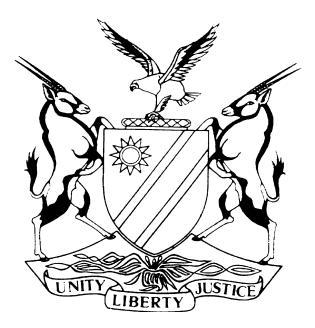REPUBLIC OF NAMIBIA

HIGH COURT OF NAMIBIA MAIN DIVISION, WINDHOEK
RULING
PRACTICE DIRECTION 61
Case Title: NAMIBIAN OFFICE EQUIPMENT COMPANY (PTY) LTD T/A NASHUA NAMIBIA PLAINTIFF and DEIDRE DE WAAL DEFENDANT | Case No: HC-MD-CIV-ACT-CON-2023/03755 | |
Division of Court: HIGH COURT (MAIN DIVISION) | ||
Heard before: HONOURABLE MR JUSTICE PARKER, ACTING | Date of hearing: 3 APRIL 2024 | |
Delivered on: 24 APRIL 2024 | ||
Neutral citation: Namibian Office Equipment Company (Pty) Ltd t/a Nashua Namibia v De Waal CC (HC-MD-CIV-ACT-CON-2023/03755) [2024] NAHCMD 188 (24 April 2024) | ||
IT IS ORDERED THAT:
| ||
Following below are the reasons for the above order: | ||
PARKER AJ: [1] The plaintiff brought the instant application to amend its particulars of claim (‘POC’). The summons, together with the POC, was filed on 14 August 2023. The defendant’s plea was filed on 2 October 2023. The plaintiff’s notice to amend was filed some 16 court days (on 25 October 2023) after the filing of the plea. [2] I have set out the foregoing dates for the filing of process to make the crucial point, with reference to I A Bell Equipment Company (Namibia) (Pty) Ltd v Roadstone Quarries CC,1 that the court is not presented with ‘a late amendment’. In that regard, it has been said that the requisite of ‘a reasonably satisfactory explanation for a proposed amendment is strongest where it is brought late in the proceedings’.2 As I have found, the amendment was not brought late in the proceedings as the notice to amend was filed on 25 October 2023 and the application to amend was brought on 27 March 2024 after going through the procedures prescribed in rule 32 (9) and (10) of the rules of court. In any case, in the circumstances, I find that the plaintiff has given a reasonably satisfactory explanation for the proposed amendment. The plaintiff has explained that it was the nature of the defendant’s defence that prompted the amendment. [3] That being the case, this court cannot compel the plaintiff – ‘to stick to a version either of fact or law that it says no longer represents its stance. That is so because litigants must be allowed in our adversarial system to ventilate what they believe to be the real issue(s) between themselves and the other side’.3 [4] But that is not the end of the matter. Under the first and second claims, the plaintiff seeks to introduce two alternative claims. One relies on the doctrine of quasi-mutual assent, alternatively on tacit agreement. The other relies on a claim in enrichment. [5] The doctrine of quasi-mutual assent may be applied where in the absence of true mutual assent to the agreement, a contract might be founded upon what is termed quasi-mutual assent. Thus, in the absence of true mutual assent, a contract can be founded on quasi-mutual assent. The doctrine is in line with the proposition that in South African law and Namibian law, there are two bases on which to establish a valid contract: consensus and reasonable reliance.4 [6] ‘Reasonable reliance’ connotes quasi-mutual assent. Therefore, I see no legal impediment prohibiting a plaintiff to plead ‘quasi-mutual assent’ as an alternative to an express contract or plead a tacit contract as an alternative to an express contract.5 In that regard, in terms of rule 45(8) of the rules of court, it is not necessary for the plaintiff to state the circumstances from which an alleged tacit term can be inferred. [7] I find that under the proposed amendment under the present head, the plaintiff has pleaded the relevant facts, and the allegations made establish a sufficient cause of action as far as the amendments that rely on the doctrine of quasi-mutual assent and tacit agreement are concerned. [8] The same cannot be said of the amendment that is based on a ‘claim in enrichment’. Mr Olivier, counsel for the defendant, submitted that there is no principle in our law that allows the owner to claim from the ‘purchaser’ the value of the use of the land while the ‘purchaser’ was in occupation. I see that Mr Lochner, counsel for the plaintiff, agreed with him. It follows that the amendment under the present head in relation to ‘a claim in enrichment’ is offensive of the law and cannot be allowed. [9] Based on these reasons, I hold that the plaintiff has succeeded partially and the defendant, too, has succeeded in resisting part of the amendments sought. That being the case, it is fair and reasonable that I make no order as to costs. | ||
Judge’s signature: | Note to the parties: | |
Not applicable. | ||
Counsel: | ||
PLAINTIFF | DEFENDANT | |
L Lochner of Fisher, Quarmby & Pfeifer, Windhoek | J Olivier of Jan Olivier & Co., Walvis Bay c/o Ellis Shilengudwa Inc. | |
1 I A Bell Equipment Company (Namibia) (Pty) Ltd v Roadstone Quarries CC [2014] NAHCMD 306 (17 October 2014).
2 Petrus T Damaseb Court-Managed Civil Procedure of the High Court of Namibia: Law, Procedure and Practice 1 ed (2020) at 143.
3 Ibid at 145.
4 Geomar Consult CC v China Harbour Engineering Company Ltd Namibia [2021] NAHCMD 455 (5 October 2021) para 4.
5 LTC Harms Amler’s Precedents of Pleadings 4ed (1993) at 76.